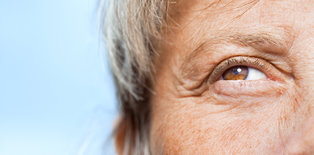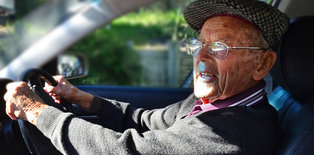Spotting Depression in Older Adults

When you notice changes in an older adult in your life, such as increased forgetfulness or mood swings, it’s natural to worry about the onset of dementia. However, you may want to consider the possibility that the senior is suffering from depression instead. A lack of engagement, an increase in fatigue and forgetfulness can be signs of depression, which often goes untreated in the elderly.
How common is depression in seniors?
It is estimated that more than two million of the 34 million Americans age 65 and older suffer from some form of depression.
The signs of depression include lack of energy, irritability, pessimism, difficulty sleeping, trouble concentrating, and aches and pains that don’t go away. Unfortunately, some might dismiss these as inevitable consequences of aging, but they can also signal depression. Some older patients might minimize their symptoms because of the stigma attached to mental illness.
It’s important to reinforce that depression can be helped with treatment, just like diabetes or hypertension. Depression is something we screen for during annual physicals, asking patients if they have felt sad or blue during the past two weeks, and if they are still enjoying their favorite activities. Depending on the answers, we may dig a little deeper to determine if our patient may be experiencing depression.
Depression may arise as a patient is dealing with the after-effects of a heart attack or a diagnosis of Parkinson’s disease. Understandably, depression may go hand-in-hand with early stages of dementia. If it isn’t addressed, it can hinder a person’s ability to cope with the other health issues.
Can depression be treated effectively with medication?
Certainly, but prescribing antidepressants isn’t the first recommended treatment option. Professional counseling helps many people with depression; therapy teaches patients new ways to think and act and how to change habits that may be making their depression worse.
Therapy can be used in combination with antidepressants with great success.
What can an adult child or caregiver do if they notice signs of depression or dementia in a loved one?
If you notice that a family member or friend seems forgetful, confused, or disinterested in things they formerly enjoyed, you should encourage them to visit their primary care physician for a checkup.
Physicians will screen the patient for depression, give them a brief cognitive test to assess impairment, observe their body language, and get a sense of their state of mind.
Many factors could be contributing to what seems like depression or the beginnings of dementia. Drug side effects may play a part — I ask patients to bring in the bottles of all their medications, including supplements or herbal remedies. I might test for a vitamin B12 deficiency, which can cause neuropsychiatric symptoms such as anxiety and depression.
Aside from medication, what are some strategies for preventing/treating depression in older adults?
Regular exercise — even getting out for a walk with a friend — may ease the symptoms of depression.
Support groups and professional counseling may help people in the early stages of Alzheimer's disease who are depressed.
It’s important to avoid social isolation. Staying active at a senior center, in a church group, or as a volunteer may relieve depressive symptoms.
If you have a loved one suffering from dementia or Alzheimer’s disease, create opportunities for them to contribute to family activities, and let them know you appreciate their contribution.
Diagnosing and treating depression, whether on its own or in combination with other conditions, will improve quality of life for both the patient and their loved one or caregiver. The road to recovery begins with a visit to a physician.
To learn more about the outpatient psychiatry programs available at Lifespan visit us online.
About the Author:
Brown Health Medical Group Primary Care
Brown Health Medical Group Primary Care provides crucial services for your long-term health and well-being at several locations in Rhode Island.
Find a Doctor

The right provider is in our network
Search more than 1,200 providers in our network.



